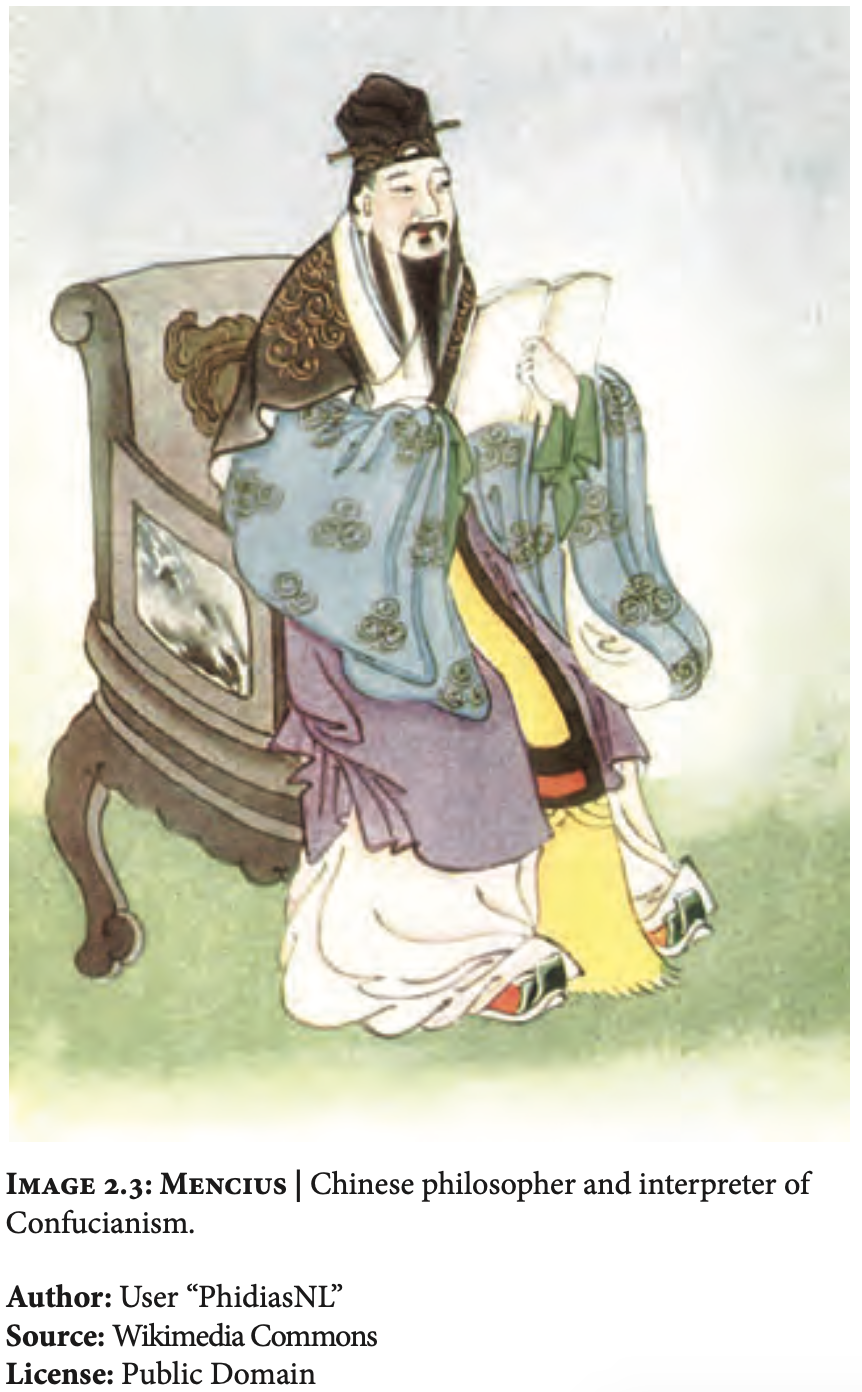 The materials for a Memoir of Mencius are very scanty. The birth and principal incidents of Confucius’ life are duly chronicled in the various annotated editions of the Ch‘un Ts‘ew, and in Sze-ma Ts‘ëen. Paucity and uncertainty of materials.
The materials for a Memoir of Mencius are very scanty. The birth and principal incidents of Confucius’ life are duly chronicled in the various annotated editions of the Ch‘un Ts‘ew, and in Sze-ma Ts‘ëen. Paucity and uncertainty of materials.
It is not so in the case of Mencius. Ts‘ëen’s account of him is contained in half a dozen columns which are without
a single date. That in the “Cyclopædia of Surnames” only covers half a page. Chaou K‘e is more particular in regard to the early years of his subject, but he is equally indefinite. Our chief informants are K‘ung Foo, and Lëw Heang in his “Record of Note-worthy Women,” but what we find in them has more the character of legend than history.
It is not till we come to the pages of Mencius himself that we are treading on any certain ground. They give the principal incidents of his public life, extending over about twenty-four years. We learn from them that in the course of that time he was in such and such places, and gave expression to such and such opinions; but where he went first and where he went last, it is next to impossible to determine. I have carefully examined three attempts, made by competent scholars of the present dynasty, to construct a Harmony that shall reconcile the statements of the “Seven Books” with the current chronologies of the time, and do not see my way to adopt entirely the conclusions of any one of them. The value of the Books lies in the record which they furnish of Mencius’ sentiments, and the lessons which these supply for the regulation of individual conduct and national policy. It is of little importance that we should be able to lay them down in the strict order of time.
With Mencius’ withdrawal from public life, all traces of him disappear. All that is said of him is that he spent his latter years along with his disciples in the preparation and publication of his Works.
From this paragraph it will be seen that there is not much to be said in this section. I shall relate, first, what is reported of the early years and training of our philosopher, and then look at him as he comes before us in his own pages, in the full maturity of his character and powers.
Mencius is the latinized form of Măng-tsze, “The philosopher Măng.” His surname, birth-place; parents; the year of his birth, bc 371.
His surname thus connects him with the Măng or Măng-sun family, one of the three great Houses of Loo, whose usurpations were such an offence to Confucius in his day. Their power was broken in the time of duke Gae (bc 493 467), and they thenceforth dwindle into comparative insignificance. Some branches remained in obscurity in Loo, and others went forth to the neighbouring States.
The branch from which Mencius sprang found a home in the small adjacent principality of Tsow, which in former times had been made known by the name of Choo. It was absorbed by Loo, and afterwards by Ts‘oo, and its name is still retained in one of the districts of the department of Yen-chow in Shan-tung. Confucius was a native of a district of Loo having the same name, which many contend was also the birth-place of Mencius, making him a native of Loo and not of the State of Tsow. To my mind the evidence is decidedly against such a view.
Mencius’ name was K‘o. His designation does not appear in his Works, nor is any given to him by Sze-ma Ts‘ëen or Chaou K‘e. The latter says that he did not know how he had been styled; but the legends tell that he was called Tsze-keu, and Tsze-yu. The same authorities if we can call them such say that his father’s name was Keih, and that he was styled Kung-e. They say also that his mother’s maiden surname was Chang. Nothing is related of the former but that he died when his son was quite young, but the latter must have a paragraph to herself. “The mother of Mencius” is famous in China, and held up to the present time as a model of what a mother should be.
The year of Mencius’ birth was probably the 4th of the emperor Lëeh, bc 371. He lived to the age of 84, dying in in the year bc 288, the 26th of the emperor Nan, with whom terminated the long sovereignty of the Chow dynasty. The first twenty-three years of his life thus synchronized with the last twenty-three of Plato’s. Aristotle, Zeno, Epicurus, Demosthenes, and other great men of the West, were also his contemporaries. When we place Mencius among them, he can look them in the face. He does not need to hide a diminished head.
It was his misfortune, according to Chaou K‘e, “to lose his father at an early period; but in his youthful years he enjoyed the lessons of his kind mother, who thrice changed her residence on his account.”
Mencius’ mother.
At first they lived near a cemetery, and Mencius amused himself with acting the various scenes which he witnessed at the tombs. “This,” said the lady, “is no place for my son;” and she removed to a house in the market-place. But the change was no improvement. The boy took to playing the part of a salesman, vaunting his wares, and chaffering with customers. His mother sought a new house, and found one at last close by a public school. There her child’s attention was taken with the various exercises of politeness which the scholars were taught, and he endeavoured to imitate them. The mother was satisfied. “This,” she said, “is the proper place for my son.”
Han Ying relates another story of this period. Near their house was a pig-butcher’s. One day Mencius asked his mother what they were killing the pigs for, and was told that it was to feed him. Her conscience immediately reproved her for the answer. She said to herself, “While I was carrying this boy in my womb, I would not sit down if the mat was not placed square, and I ate no meat which was not cut properly; so I taught him when he was yet unborn. And now when his intelligence is opening, I am deceiving him; this is to teach him untruthfulness!” With this she went and bought a piece of pork in order to make good her words.
As Mencius grew up, he was sent to school. When he returned home one day, his mother looked up from the web which she was weaving, and asked him how far he had got on. He answered her with an air of indifference that he was doing well enough, on which she took a knife and cut the thread of her shuttle. The idler was alarmed, and asked what she meant, when she gave him a long lecture, showing that she had done what he was doing, that her cutting her thread was like his neglecting his learning. The admonition, it is said, had its proper effect; the lecture did not need to be repeated.
There are two other narratives in which Chang-she figures, and though they belong to a later part of Mencius’ life, it may be as well to embrace them in the present paragraph.
His wife was squatting down one day in her own room, when Mencius went in. He was so much offended at finding her in that position, that he told his mother, and expressed his intention to put her away, because of “her want of propriety.” “It is you who have no propriety,” said his mother, “and not your wife. Do not ‘the Rules of Propriety’ say, ‘When you are about to ascend a hall, raise your voice; when you enter a door, keep your eyes low?’ The reason of the rules is that people may not be taken unprepared; but you entered the door of your private apartment without raising your voice, and so caused your wife to be caught squatting on the ground. The impropriety is with you and not with her.” On this Mencius fell to reproving himself, and did not dare to put away his wife.
One day, when he was living with his mother in Ts‘e, she was struck with the sorrowfulness of his aspect, as he stood leaning against a pillar, and asked him the cause of it. He replied, “I have heard that the superior man occupies the place for which he is adapted, accepting no reward to which he does not feel entitled, and not covetous of honour and emolument. Now my doctrines are not practised in Ts‘e: I wish to leave it, but I think of your old age, and am anxious.” His mother said, “It does not belong to a woman to determine anything of herself, but she is subject to the rule of the three obediences. When young, she has to obey her parents; when married, she has to obey her husband; when a widow, she has to obey her son. You are a man in your full maturity, and I am old. Do you act as your conviction of righteousness tells you you ought to do, and I will act according to the rule which belongs to me. Why should you be anxious about me?”
Such are the accounts which I have found of the mother of Mencius. Possibly some of them are inventions, but they are devoutly believed by the people of China; and it must be to their profit. We may well believe that she was a woman of very superior character, and that her son’s subsequent distinction was in a great degree owing to her influence and training.



 The materials for a Memoir of Mencius are very scanty. The birth and principal incidents of Confucius’ life are duly chronicled in the various annotated editions of the Ch‘un Ts‘ew, and in Sze-ma Ts‘ëen. Paucity and uncertainty of materials.
The materials for a Memoir of Mencius are very scanty. The birth and principal incidents of Confucius’ life are duly chronicled in the various annotated editions of the Ch‘un Ts‘ew, and in Sze-ma Ts‘ëen. Paucity and uncertainty of materials.